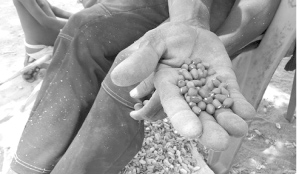By AMOS ZULU –
SMALL-SCALE farmers account for 80 per cent in Sub-Saharan Africa. In Zambia, smallholders who constitute the largest component of farmers in the country contribute about 90 per cent of the food consumed.
However, maize centrism by many smallholder farmers is at the expense of other equally or even more profitable cash crops.
It is this reason that the Zambian Government is promoting crop diversification among farmers, this is because the dependence on just one crop can have severe consequences and leave small-scale farmers open to unnecessary risks.
The Smallholder Productivity Promotion Programme (S3P), a project in the Ministry of Agriculture and Livestock (MAL) has an ambitious programme of promoting the growing of crops such as groundnuts, mixed beans, cassava, and rice.
The programme which is funded by the International Fund for Agricultural Development (IFAD) is centered on increasing production, productivity and sales among targeted poor households in rural Zambia.
According to S3P Programme Manager Martin Liywalii, outcomes of the programme will mean that targeted smallholder farmers have improved access to more pertinent and effective advisory services, improved rural infrastructure and access to productivity enhancing works and equipment among others.
“Implementation has began in eight districts in Luapula and Northern provinces with the commodity focus of cassava, mixed beans, groundnuts and rice. So, the geographic scope is eight districts in Luapula Province, nine districts in Northern Province and seven districts from Muchinga Province,” he said.
The US$39.9 million funded project will be implemented in 24 districts of Muchinga, Luapula and Northern provinces of the country.
The programme is supported by IFA cost of US$24.8 million loan. The Government of Finland has given a grant of US$ 7.1 million with the Zambian Government contributing US$ 6.1million towards the same programme. The remaining amount is from participating districts and beneficiaries under the local agricultural investments grant scheme.
Mr Liywalii who led a team of S3P officials to Muchinga and Northern provinces to introduce the project and check on the implementation progress, says launching for Muchinga Province will take place in 2015.
“We are here in Mpika to introduce S3P and guide on how to prepare plans. We will launch the project here in 2015, and Muchinga will be our third province after Luapula and Northern where implementation has already started.
“You can see that cassava, rice, groundnuts, and mixed beans are some of the crops that can help improve on nutrition and food security situations for the people, but most importantly, they are cash crops, just like maize which can increase incomes. These are commodities that can bring incomes,” noted Mr Liywalii.
He also explained that while his organisation will focus on productivity among smallholders up to the farm gate, the Smallholder Agribusiness Promotion Programme (SAPP) will pick it up to market the commodities in the selected areas.
“IFAD is also supporting the Smallholder Agribusiness Promotion Programme (SAPP). So, what this means is, S3P focuses on productivity up to the farm gate while SAPP picks it up to develop the value chain, to market the farmers produce,” explained Mr Liywalii.
Muchinga Province orovincial agricultural coordinator Victor Mulopa appealed to the Ministry of Agriculture staff to own the programme and help farmers adopt the project.
Dr Mulopa said that the programme had great potential to help alleviate poverty among the smallholder households in the province.
And at a workshop on exploiting business opportunities through participatory and bottom up planning held in Kawambwa, District Commissioner Ivor Mpasa said it was Government’s policy that people graduated from poverty to prosperity.
Mr Mpasa said planning was an important component in reducing poverty throughout the country.
“We should plan with a view to reducing poverty in Kawambwa, Luapula and the country in general. The Government talks about poor people, it is a pro-poor Government,” he said.
Mr Mpasa also appealed to farmers in his district to approach the Smallholder Productivity Promotion Programme with a changed approach. He said this was with a view of helping to alleviate poverty in the district.
The Kawambwa District Commissioner also thanked representatives from IFAD and the Finish Government for showing interest in investing in rural people.
“You are coming to a rural district with rural people, yes, but these people have potential that has remained untapped for ages. Our attitude as farmers is sometimes bad. I appeal that we have a changed approach towards this programme because we are the drivers of this programme which should not fail,” he added.
“Even the Bible says that God does not want poor and arrogant people. These people have come to our district with a programme that is aimed at alleviating poverty. My office welcomes all interventions by our co-operating partners which are aimed at uplifting the living standards of our people,” said Mr Mpasa.
The Smallholder Productivity Promotion Programme will adopt a phased programmatic approach and will be implemented over a period of seven years. Implementation of the programme started in 2011 and is expected to end in 2018.-NAIS







